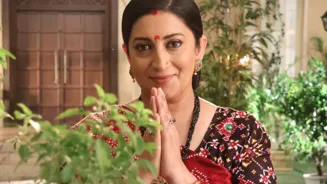Smriti Irani’s return to television with Kyunki Saas Bhi Kabhi Bahu Thi 2 has been making waves, not only for nostalgia’s sake but also for her record-breaking pay-check. Reports suggest she is charging
Rs 14 lakh per episode, making her the highest-paid actor on Indian television, surpassing contemporaries like Anupamaa’s Rupali Ganguly (approx Rs 3 lakh per episode) and Hina Khan (up to Rs 2 lakh).
In an exclusive conversation with CNN-News18, Irani confirmed the news without hesitation. When asked about her journey from a struggling actress who landed the role of Tulsi in 2000 to becoming television’s top earner, she smiled and said, “Yes, I see the glee on your face.”
She elaborated on why such remuneration is justified for professionals who consistently deliver. “You also set that benchmark as a professional to say that if you deliver on history on numbers and revenue, why not? Because not everybody who’s watching us knows we get to negotiate our contracts as employees. I’m a part of a union, so the first thing I do is actually have my union number registered. We all are part of a larger organisation and flow of work. For one person to stand up and say listen, not only pay parity, I beat the boys and the girls and how much I make that is a lot of hard work,” she said.
For Irani, the role of a lead actor goes beyond individual success. “The idea is, are you truly the star or do you have the professional capacity to make stars around you? I think that I have actually, mercifully, had the capacity of making stars out of others who are with me. If there is a Tulsi, then Amar Upadhyay quintessentially creates his own market. So do you become that pivot, that sounding board, that other actors then can enhance their economic value? That I have managed to do through the project, so my co-stars today can say, ‘Oh, we are a part of that.’”
She emphasised that such influence comes with responsibility. “There is a presumption that you have to be damn good at your job if you are a part of that show. And obviously, that means there’s a lot of economic benefit they get.”
When asked if younger actors view her more as a seasoned performer or as a politician, Irani said, “What is extremely satisfying for me is the fact that many of them discuss politics, they want to know how Parliament works. Amar (Upadhyay) is the one that has spoken about it, I spoke about it.”












